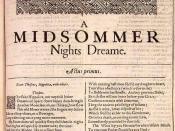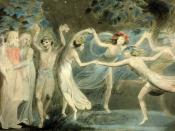In William Shakespeare's A Midsummer Night's Dream, the most important, recurring theme is jealousy. Best defined as resentment, anger, or sadness caused by longing or suspicion, jealousy motivates the characters' actions and feelings and influences the events of the story throughout the play. Between Helena, Hermia, Demetrius, Lysander, and even the fairies, jealousy is a very significant, driving force. One of the most powerful, complex human emotions is that of jealousy, and this is a dominant theme in A Midsummer Night's Dream.
One good example of jealousy in A Midsummer Night's Dream is Helena's jealousy toward Hermia at the beginning of the play. Hermia had something Helena wanted more than anything else: Demetrius' love. This caused Helena to become very jealous and had various negative effects on her mental state. She became suspicious and angry toward Helena. In their fight later in the play, she remarks, "O, when she's angry, she is keen and shrewd! / She was a vixen when she went to school;/ And though she be but little, she is fierce," (3.2.323-325)
a nasty comment to make to someone who was once a close friend. She also started to think much less of herself and have a low self-esteem. This is memorably evidenced when she follows Demetrius through the woods and begs him to take her back as he chased after his true love Hermia. She even pathetically pleads to Demetrius, "What worser place can I beg in your love, --/ And yet a place of high respect with me,--/ Than to be uséd as you use your dog?" (2.1.208-210) In her love and jealousy, she lowers herself to the level of a dog, showing how jealousy, especially over love, can devastate someone emotionally.
When Puck accidently makes both Demetrius and Lysander fall in love with Helena, Hermia similarly experiences jealousy. She too quickly starts to think less of herself. In her self-pity and insecurity, she even suggests it is Helena's height that caused the two men to change the objects of their affection, saying "Now I perceive that she hath made compare/ Between our statures; she hath urged her height." (3.2.290-291) Although this hadn't even been mentioned to that point, they both start to use this against her, with Lysander even telling her, "Get you gone, you dwarf;/ You minimus, of hindering knot-grass made;/ You bead, you acorn." (3.2.327-239) Clearly, her jealousy caused her self-esteem to be drastically hurt, and this in turn caused the men to think less of her as well, similar to what happened between Helena and Demetrius earlier. Furthermore, her jealousy causes her to become enraged to the point of physical violence toward Helena. In one unforgettable line, she says, "How low am I? I am not yet so low/ But that my nails can reach unto thine eyes." (3.2.297-298) This threat is toward what used to be a good friend of Hermia's and someone she was close to since childhood. This further comments on the power of jealousy to cause anger and conflict.
Another prominent example of jealousy in A Midsummer Night's Dream is in the relationship between Oberon and Titania. First off, Oberon is jealous of Titania's Indian servant boy, and this causes a long fight between the two of them. This is a relatively simple example of jealous; Oberon is angry and resentful toward Titania because of his envy of her "possession." He declares, "I do but beg a little changeling boy,/ To be my henchman" (2.1.120-121) In their argument, they both accuse each other of loving another. Titania says Oberon has feelings for the human lady Hippolyta, while Oberon claims Titania loves Hippolyta's fiancé Theseus, the duke of Athens. The jealous Oberon retorts, "How canst thou thus for shame, Titania, / Glance at my credit with Hippolyta, / Knowing I know thy love to Theseus?" (2.1.74-76) This probably unfounded suspicion further shows jealousy's link with love and how it can be the result of something else and sometimes can be illogical and ridiculous.
The powerful influence of jealousy is present throughout A Midsummer Night's Dream and throughout life. From the stories of the Bible to important historical events to the everyday lives of just about everybody, jealousy is a strong and unpredictable emotion. In this play, there are two parallel examples of jealousy between Helena, Hermia, and the main action of the story is a product of the jealousy of the fairy king Oberon. Jealousy influences almost every character and every major plot turn and is in my opinion the most important theme of the play.
BibliographyCrowther, John, ed. "No Fear A Midsummer Night's Dream." SparkNotes.com. SparkNotes LLC. 2005. Web. 21 May 2009.
Shakespeare, William. A Midsummer Night's Dream. 1596. Print.





